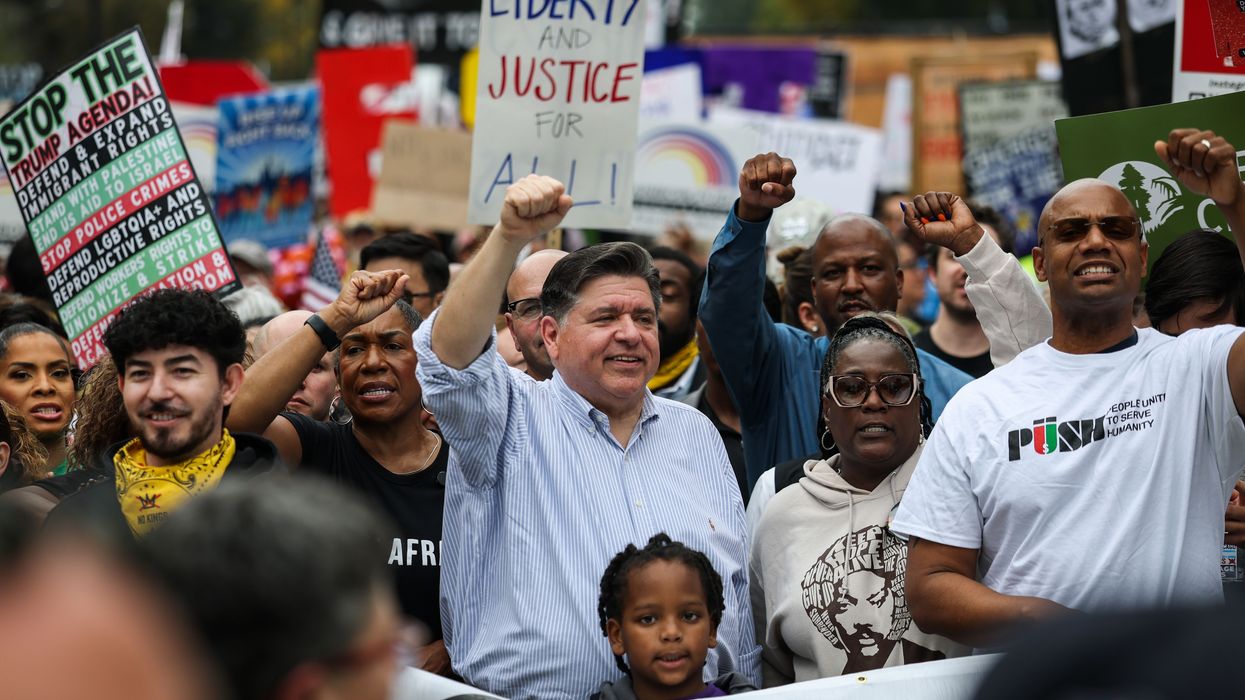On Wednesday, May 25, the Senate Foreign Relations Committee will host the State Department's leading Iran negotiator, Robert Malley. The hearing comes at an extremely serious moment: Iran is on the brink of becoming a nuclear threshold state; yet the hearing may be profoundly unserious, offering political opponents of the negotiations an opportunity to score political points and further undermine ongoing diplomatic efforts to prevent a nuclear-armed Iran. We encourage editorial boards and journalists to provide serious coverage of the current stakes of the Iran nuclear crisis and cut through the political circus being constructed by organizations and lawmakers dedicated to opposing U.S. diplomacy with Iran.
While some members of the committee may be preparing to score political points or get their "gotcha" moment to brandish their Iran hawk or pro-Israel credentials, in the real world we are on a proliferation precipice: since the Trump Administration's decision to abandon the JCPOA, Iran has gradually ratcheted up its nuclear work and is now on the precipice of becoming a nuclear threshold state. Nonproliferation experts have warned that Iran's nuclear breakout - the time it would take to secure sufficient fissile material for a nuclear weapon, if Iran chose to do so - is now just two weeks and dropping. This means that Iran could soon have an undetectable breakout capability.
Proponents of diplomacy argue that the restoration of the 2015 accord that the Trump administration violated, known as the Joint Comprehensive Plan of Action, is vital to extending that window and avoiding the worst case scenario of Iran as a threshold nuclear power or a military campaign to set back Iran's program that could invite a host of disastrous consequences. Opponents, however, argue against an agreement but have not offered any viable diplomatic solutions to the issue at hand - namely, what can the U.S. do without an agreement and short of a bombing campaign that would prevent Iran from reaching this nuclear milestone?
Unfortunately, observers looking to this Senate committee hearing hoping for a substantive update or debate are likely to be disappointed as the hearing may shape up to be highly-scripted political theater - as opponents of diplomatic efforts regarding Iran seek to politicize the debate and double down on personal attacks and insinuations against Malley and the Biden Administration. The appearance of the leading U.S. official in the midst of sensitive negotiations is significant, and opponents of the efforts will likely utilize the opportunity to make life even more difficult for U.S. diplomats. One of the two witnesses invited to testify in the second part of the hearing, Foundation for Defense of Democracy's Mark Dubowitz, has himself engaged in personal attacks and trolling against Malley, and was the most prominent advocate for sanctions during the Trump Administration that were designed to impede a Democratic Administration from restoring an Iran nuclear deal.
The leadership of the committee is also not representative of the views of the Senate or the American public. Americans broadly support a restoration of the nuclear agreement. The issue is highly partisan, with all but a handful of Republican legislators opposed in lockstep to the accord and all but a handful of Democrats supportive of efforts to restore the agreement. Yet the Democratic chairman of the Committee, Robert Menendez, is a stalwart Iran hawk who clashed publicly with Obama administration officials, including Antony Blinken, and is playing a similar role under Biden.
Below are key details to keep in mind in advance of this pivotal hearing:
Nonproliferation Benefits:
Under a renewal of the JCPOA, the advancements in Iran's nuclear program would be rolled back. Under these strong nonproliferation benefits, Iran would be unable to procure a nuclear weapon for the foreseeable future. If a deal is finalized, we will see the following immediate nonproliferation benefits:
As of February, Iran had more than 3,000 kilograms of enriched uranium and currently has approximately 42 kg enriched to the 60% U-235 threshold.
- Under the JCPOA, Iran reduces its enriched uranium stockpile to 300 kg or less, a fraction of the amount needed for a single nuclear weapon with further enrichment. This restriction would remain through 2030 even if no new agreement is reached;
- Iran ships out or downblends its 20% and 60% enriched uranium stockpile and limits enrichment to 3.67%, far below weapons grade, through 2030;
Iran is presently enriching with advanced centrifuges at the deeply-buried Fordow facility.
- Iran would halt all uranium enrichment at Fordow and engage in no proliferation-sensitive work at the facility through 2030;
Iran has significantly expanded its work with advanced centrifuges and uranium metal.
- Under the JCPOA, Iran would remove excess advanced centrifuges and place them in monitored storage, ensuring that only IR-1 centrifuges are used to accumulate enriched uranium through at least 2025;
- Iran would halt work on uranium metal through 2030, and ship out any uranium metal it has produced;
IAEA Inspectors have limited access to Iran's enrichment facilities and other nuclear facilities without the implementation of the Additional Protocol.
- Iran will resume compliance with the IAEA Additional Protocol, ensuring Iran's entire nuclear fuel cycle will be closely monitored and the IAEA has enhanced powers to detect any potential covert cheating;
Iran's breakout - the time it would take for Iran to produce sufficient fissile material for a single nuclear weapon - is down to days.
- Iran's breakout time would once again be measured in months instead of days and could approach the 12+ month timeline established by the JCPOA in 2016.
>> Critically, there is no viable diplomatic alternative that could establish a similar level of nonproliferation protections. Bombing Iran's nuclear facilities would not erase Iran's nuclear knowledge and would only incentivize Iran to build back deeper and without international inspectors, ensuring Iran would eventually weaponize.
What's The Final Hurdle?
Enrique Mora, Deputy Secretary General of the European External Action Service, has traveled to Iran twice since March in an effort to resolve what may be the last remaining hurdle in restoring the JCPOA: the Trump administration's unprecedented designation of the Islamic Revolutionary Guard Corps (IRGC) - a major branch of the armed forces in Iran - as a foreign terrorist organization (FTO). Iran is adamant that the unprecedented designation be removed as part of a return to the JCPOA, while the Biden administration appears to have ruled this out and insisted on separate concessions outside of the nuclear file in return.
- Mark Dubowitz, a witness in Panel II, responded to Democratic pledges to return to the JCPOA in April 2019 by urging Trump to implement a "wall of additional sanctions that a [Democratic] successor could not easily dismantle." Among the many suggestions was a call to designate the IRGC as an FTO, suggesting that "international companies would stay out of Iran" as long as it is in place. Trump followed suit days later.
- The designation of the IRGC as an FTO helped to push Iran out of compliance with the JCPOA and triggered a dramatic deterioration in regional security, as many observers foresaw at the time.
- As State Department spokesperson Ned Price stated, "From 2012 to 2018, there were no significant attacks, there were no attacks against U.S. service members, diplomatic facilities in Iraq. That changed in 2018. And between 2019 and 2020, the number of attacks from Iran-backed groups went up 400 percent. This was in the aftermath of the decision to abandon the JCPOA. It was in the aftermath of the decision to apply the FTO designation to the Iranian Revolutionary Guard Corps. It was in the aftermath of the killing of Soleimani, the IRGC chief."
- The IRGC has been one of the world's most sanctioned entities, which has not changed regardless of the status of the JCPOA. Even if the FTO designation is removed in the weeks ahead, the IRGC would remain one of the most sanctioned entities on planet Earth due to multiple overlapping sanctions, and will remain radioactive to outside business.
- While the FTO designation has imposed significant costs on U.S. interests, it is almost completely duplicative of existing U.S. sanctions authorities against the IRGC. As Sec. Blinken stated, "as a practical matter, the designation does not really gain you much because there are a myriad of other sanctions on the IRGC. The primary sanction when it comes to the FTO designation actually is a travel ban and the people affected by that ban when it comes to the IRGC - as you know the IRGC is a large force that has a lot of conscripts in it. They would not be able to travel, the people that are the real bad guys have no intentions of traveling here anyway."
- From Iran's perspective, it has already compromised on some of its preferences, including not demanding compensation for the U.S. withdrawal or guarantees the deal would be implemented by the U.S. beyond 2024. Particularly given the perceived trail from FTO designation to the assassination of IRGC general Qassem Soleimani, it has become exceedingly difficult for Iran to relent on the FTO dispute.
The bottom line: it would be disastrous for the Biden administration to allow a duplicative designation designed to tie Biden's hands to be the difference between rolling back Iran's nuclear program through diplomacy and Iran becoming a nuclear threshold state or the U.S. going to war to stop that outcome.
Failures of Maximum Pressure:
Trump's so-called "maximum pressure" policies failed across the board. Biden administration officials routinely point out as much, though they are less forthcoming about their failure to find a way off the maximum pressure track. Biden has relieved no significant sanctions, and the Iranian economy has been devastated throughout the sixteen months of Biden's time in office. Ordinary Iranians, and not the regime, pay the biggest costs when inflation hovers around 40%, pushing millions into poverty.
When Donald Trump withdrew from the JCPOA, he promised to start "working with our allies to find a real, comprehensive, and lasting solution to the Iranian nuclear threat. This will include efforts to eliminate the threat of Iran's ballistic missile program, to stop its terrorist activities worldwide, and to block its menacing activity across the Middle East."
All of that was a lie.
- Rather than a real, comprehensive and lasting solution to the nuclear threat, Iran went from a full year breakout to days. Some of the knowledge Iran has gained in this time can't be unlearned.
- Iran's missile program became more advanced than ever, with Iran executing a stunning attack on Saudi facilities at Abqaiq and retaliating on U.S. bases in Iraq after the killing of Soleimani.
- Tensions throughout the Middle East soared, with threats increasing against both U.S. troops in Iraq and on oil shipping through the Persian Gulf.
Critically, maximum pressure has impoverished ordinary Iranians and helped worsen the human rights situation in the country.
- Within Iran, withdrawal from the deal gave hardliners an upper hand in wresting control of all levers of government back from moderates.
- Human rights within the country has deteriorated further, with vocal human rights champions being subjected to harsh prison sentences and many organizers focused on providing basic sustenance.
- As human rights defender Narges Mohammadi stated this year prior to the start of a new, unjust prison term for her political activities, "Economic sanctions, because they weren't targeted or based on adequate knowledge of the state, weakened Iranians economically more than they weakened the Iranian regime...In fact, they strengthened the Iranian regime, and hard-line individuals and groups in the country, including the Islamic Revolutionary Guard Corps. This did not benefit democracy in Iran."
What's the alternative to the JCPOA?
Biden has been right to try to restore the JCPOA, though he has lacked the political will that has been necessary to reach the finish line. Regrettably, this means that the likelihood of reaching a no deal scenario has increased dramatically. If this occurs, Biden is likely to be left with two disastrous options: Iran on the threshold of a nuclear weapon or war to try to prevent that outcome from happening.
The architects of maximum pressure have been clear what they think Biden should do. Even when negotiations show promise, there is hardly a month that goes by without major calls to bomb Iran.
- This includes Mark Dubowitz and Mathew Kroenig, who in January published a piece saying that when nuclear negotiations fail, "the president should order military strikes on Iran's nuclear facilities to prevent Tehran from building the bomb."
- War hawks consistently downplay the costs of war and play up the potential gains - this was the case in the drumbeat to war against Saddam Hussein's Iraq and is the same for advocates of war with Iran.
- War with Iran would not be the cakewalk many portray. Iran has prepared for such a conflict for years and has numerous capabilities, including missiles and proxies, that could quickly turn a conflict over Iran's nuclear program into a messy regional war.
- If such a war were to come under the Biden administration, with oil markets tight and Russia's invasion of Ukraine still ongoing, it would be a huge disaster, militarily, strategically and economically. A diplomatic solution is still by far the best option for the U.S. and Iran. Biden must see it through.




